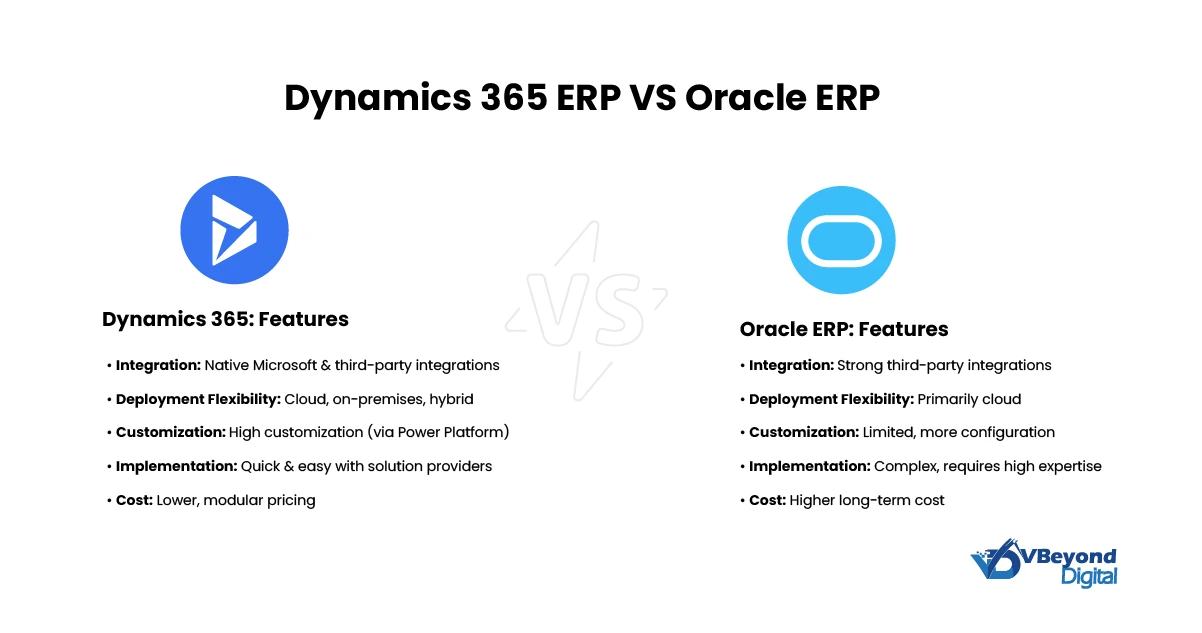An Overview of Anticipated Features for Dynamics 365 CRM with 2025 Release Wave 1
Section
Table of Contents
- Microsoft Dynamics 365 2025 Release Wave 1: What We Know So Far
- 2025 Release Wave 1 Expected Features Building on from 2024 Release Wave 2
- Why Choose Dynamics 365 Business Central Over Others?
- Why Choose Dynamics 365 CRM for Enterprises?
- Conclusion: Dynamics 365 2025 Release Wave 1
- FAQs ( Frequently Asked Questions)
It’s going to be that time of the year again soon—the next Microsoft Release Wave, and the first for 2025, covering Dynamics 365, Power Platform, and Microsoft Cloud for Industry suites will be announced soon. The release, scheduled to begin late March 2025 onwards into Q2. In this blog, we are specifically looking at anticipated features and updates in Dynamics 365 Business Central and Dynamics 365 CRM in the 2025 Release Wave 1.
As Microsoft continues to make great strides with AI and cloud, its enterprises solutions will have increasingly more to offer its users at all levels. Given this, Dynamics 365 Business Central and Dynamics 365 CRM are both among the strongest solutions suites in their categories ERP (Enterprise Resource Planning) and Customer Relationship Management (CRM) and we explore their functionalities and benefits for enterprises as compared to their counterparts.
Note: This blog talks about expected features and the content will be updated as more information on the 2025 Release Wave 1 is available.
Microsoft Dynamics 365 2025 Release Wave 1: What We Know So Far
Scheduled to be launched in March-April 2025, the 2025 Release Wave 1 for Dynamics 365 is expected to further Microsoft’s commitment to all-round innovation. This release is expected to include enhancements across various modules of Dynamics 365, including more AI and improved data analytics capabilities.
Detailed Overview and Key Dates
- Release Schedule: Dynamics 365’s 2025 Release Wave 1 is part of Microsoft’s biannual update strategy, designed to equip businesses with the latest functionalities. The release is meticulously planned to ensure smooth transitions without disrupting ongoing operations.
- Anticipated Features: The upcoming wave is expected to introduce significant advancements in automation, AI capabilities, user experience improvements, and more comprehensive data integration tools. These features aim to provide businesses with enhanced analytical tools and more intuitive user interfaces.
- Anticipated Key Dates:
- General Availability Begins: April 1, 2025
- Phased Rollout Across Regions:
- North America: April 21, 2025
- Europe: April 14, 2025
- Asia-Pacific, including Australia and Japan: April 7, 2025
- Middle East, including UAE: April 7, 2025
- Greater China, India, and South America: March 31, 2025
The features and dates mentioned are based on anticipated updates for Dynamics 365 Business Central and CRM and are subject to change based on Microsoft’s final release decisions.
Considering Dynamics 365 for your enterprise?
2025 Release Wave 1 Expected Features Building on from 2024 Release Wave 2
AI and Automation
2024 AI Milestones: Laying the Foundation
- Dynamics 365 Copilot: A major advancement in process automation by Microsoft, Copilot uses generative AI to enable increasingly complex workflows.
- Autonomous AI Agents: Microsoft launched ten pre-built AI agents tailored to areas like sales, customer service, and finance. These agents delivered on key fronts of workflow automation and real-time decision-making support.
- Copilot Studio: Aimed at customization, this workflow and process design solution has enabled businesses to create specialized AI agents using trusted data sources within Dynamics 365, opening doors to tailored solutions for unique business challenges.
Advancements in 2025: Raising the Bar with AI and Automation
- Expanded AI Agents Portfolio: New autonomous AI agents cater to industry-specific use cases like retail and healthcare, allowing organizations to streamline operations and enhance customer experiences more effectively.
- Smarter Customization with Copilot Studio: Enhancements to Copilot Studio in 2025 will make creating AI agents easier, with improved connectivity to data streams and third-party applications, empowering businesses to refine workflows dynamically.
- Advanced Azure AI Integration: Building on last year’s releases, Azure AI further strengthens Dynamics 365 with improved data analytics, machine learning capabilities, and predictive modeling. Businesses can now unlock insights faster and operationalize AI more seamlessly.
- Edge AI Integration: With Copilot Devices and Azure AI-powered hybrid approaches, businesses could look to combine edge and cloud computing for scalable AI-driven functionalities.
Data Management and Security Enhancements
New Tools and Features:
- Azure Synapse Analytics and Data Factory: Improved integration and data flows for faster, true real-time analytics.
- Improved Data Management: Precise control over data migration with enhanced historical data management.
Security and Compliance:
- Advanced Security Protocols: Include encryption and Azure Lockbox for heightened data security.
- Compliance Updates: Ensure alignment with local and international compliance requirements.
Customer Engagement and Customer Relationship Management (CRM)
AI-Driven Customer Service:
- Microsoft Copilot Integration: Automate customer service tasks, enhancing interaction quality.
- Omnichannel Experience: Unified customer service across voice, messaging, and email platforms.
Sales and Marketing Tools:
- Digital Selling Enhancements: Tools for proactive engagement and advanced sales analytics.
- Social Media and Communication Integrations: New features to enhance customer interactions and communications.
Integration and Interoperability
Enhanced Integration with Microsoft Products
Anticipated improvements to the integration with the Microsoft ecosystem may:
- Enable seamless workflows with Power Platform tools like Power Automate, Power BI, and Power Apps.
- Facilitate custom workflows and provide deeper data analysis within the platform.
- Strengthen connections with Microsoft 365 and Teams for enhanced collaboration.
- Support middle management in focused collaboration and enable smoother communication with top management for critical decisions.
Improved Connections with Third-party Applications
Expected API enhancements might:
- Simplify connecting Dynamics 365 Business Central to third-party systems.
- Improve the flow of data across platforms for more efficient operations.
Updates to custom connector support could:
- Expand integration options for external services.
- Help businesses tailor operations to meet specific needs.
Why Choose Dynamics 365 Business Central Over Others?
Dynamics 365 Business Central is easily one of the most preferred ERP solutions for growing and medium-sized enterprises in industries such as manufacturing, retail, e-commerce, and services. Its deep integration with Microsoft’s ecosystem and flexible capabilities ensure that businesses can adapt quickly to market changes and scale efficiently.
Comparison with Other Platforms:
Business Central vs. NetSuite:
- Integration: Business Central offers superior integration with Microsoft 365 and Azure, significantly enhancing collaborative and operational capabilities compared to NetSuite.
- Customization: Provides greater flexibility than NetSuite in adapting functionalities to meet diverse business requirements.
- Cost Efficiency: Features a more transparent and predictable pricing structure, offering better cost management than NetSuite.
- User Experience: Known for its user-friendly interface, Business Central is easier to use across various business types, unlike the often complex NetSuite environment.
Business Central vs. QuickBooks:
- Scope: Goes beyond basic accounting to include comprehensive functionalities like CRM and SCM, which QuickBooks does not fully support.
- Scalability: Specifically designed to support business growth and adapt to evolving operational needs, unlike QuickBooks, which is more suited to smaller operations.
- Integration: Offers deep integration with the entire Microsoft suite, providing a more unified and cohesive operational platform compared to QuickBooks.
Why Choose Dynamics 365 CRM for Enterprises?
Dynamics 365 CRM continues to develop features and functionalities across its Sales, Customer Insights, and Customer Service modules. These advancements are designed to provide businesses with more powerful tools for managing customer relationships effectively, boosting productivity, and enhancing overall customer satisfaction. Here is a closer look at what’s new and improved in each of these critical CRM modules.
Sales:
- AI-driven Insights: Leveraging artificial intelligence, the sales module now offers advanced analytics that help predict customer behaviors and sales outcomes, enabling sales teams to craft more targeted strategies.
- Enhanced Lead Management: Improved tools for tracking and nurturing leads ensure that potential customers are engaged at the right times, increasing the chances of conversion.
- Sales Performance Metrics: New dashboards and reporting features provide real-time visibility into sales activities and outcomes, helping teams to quickly adjust tactics and strategies as needed.
Customer Insights:
- Advanced Analytics: This module now integrates deeper analytics capabilities, turning vast amounts of data into actionable insights that drive more personalized customer engagements.
- Predictive Modeling: New predictive models help anticipate customer needs and preferences, allowing businesses to proactively address potential issues and opportunities.
- Segmentation Tools: Enhanced segmentation capabilities enable more precise targeting, ensuring that marketing and sales efforts are more effectively aligned with customer segments.
Customer Service:
- Automated Responses: Integration of AI and machine learning allows for routine inquiries to be handled easily, offloading non-essential tasks from human agents.
- Case Management Tools: The introduction of smarter case management solutions helps streamline workflows and improve resolution times, significantly enhancing customer satisfaction.
- Service Dashboards: New customizable dashboards provide agents and managers with a comprehensive view of service operations, from ticket volumes to agent performance, facilitating better decision-making.
Comparing Dynamics 365 CRM with Other CRM Platforms
Dynamics 365 CRM vs. Salesforce:
- Integration: Dynamics 365 CRM provides seamless integration with other Microsoft products, which enhances productivity and data utilization more effectively than Salesforce.
- Customization: Dynamics 365 extensive customization options beat others in meeting specific process needs, unlike Salesforce’s more configuration-led solutions.
- Cost: Dynamics 365 CRM is generally more cost-effective, delivering better ROI for businesses looking to optimize their CRM investments.
Dynamics 365 CRM vs. HubSpot:
- Functionality: Delivers a broader range of features, particularly in sales, customer service, and field service management, exceeding the capabilities offered by HubSpot.
- Scalability: It supports businesses of all sizes and can scale according to varying operational demands, providing more flexibility than HubSpot.

Conclusion: Dynamics 365 2025 Release Wave 1
With AI-driven enhancements, deeper integrations, and improved customization options, Microsoft Dynamics 365 ERP and CRM functionalities are getting more powerful and intuitive—just what enterprises need today. As details about these updates are available, businesses should begin assessing how new features can be used to improve their current solutions and integrated systems.
FAQs
Dynamics 365 Business Central 2025 Release Wave 1 introduces improvements such as advanced AI-driven analytics, better data management tools, and more robust security measures. Users will benefit from streamlined operations and enhanced system responsiveness, making their tasks more efficient.
Dynamics 365 CRM offers enhanced tools for managing customer relationships by integrating AI capabilities that provide real-time analytics and predictive insights. This allows businesses to improve engagement, understand customer needs more effectively, and respond to changes swiftly.
Yes, Dynamics 365 offers extensive integration capabilities with other Microsoft products and third-party applications. This integration supports consistent data flow and improves operational efficiency by connecting Dynamics 365 with software like Microsoft 365, Azure, and various external applications through APIs.
Implementing Microsoft Dynamics 365 can significantly improve operational efficiency, enhance data analysis capabilities, and boost customer engagement. It also supports better decision-making through integrated analytics and customized reporting features.
In the upcoming year, Microsoft Dynamics CRM is set to introduce new tools that enhance digital sales capabilities, improve data analysis, and provide more personalized customer service options. These updates aim to support businesses in maintaining high levels of customer satisfaction and operational productivity.




